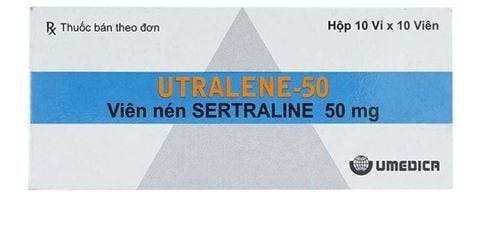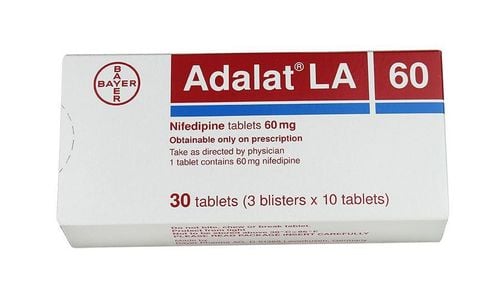This is an automatically translated article.
The drug Agidopa contains the active ingredient Methyldopa 250mg, indicated in the treatment of hypertension. Let's learn about dosage and notes when using Agidopa through the article below.
1. Uses of Agidopa
1.1. Indications "What is Agidopa 250mg?". Agidopa medicine containing the active ingredient Methyldopa 250mg is indicated in the treatment of hypertension, patients with high blood pressure and when other drugs are ineffective or ineffective.
The drug is well tolerated and relatively safe, so it can be used in both patients with kidney failure, left heart failure and the use of the drug should be prescribed by the treating doctor.
1.2. Pharmacodynamics Active ingredient Methyldopa has the effect of stimulating central alpha - adrenergic so it reduces peripheral sympathetic tone. The drug has the effect of reducing sympathetic activity and blocking adrenergic receptors.
1.3. Pharmacokinetics Absorption: Methyldopa is approximately 50% absorbed from the gastrointestinal tract. The effects of the drug appear about 4 hours after taking it and can last up to 24 hours.
Distribution: The drug is low bound to plasma proteins, crosses the placenta and the breast milk barrier.
Metabolism: Methyldopa undergoes first-pass metabolism by the liver, so the gastrointestinal bioavailability of the drug is relatively low (about 25%).
Elimination process: The drug is eliminated by the kidneys slowly, the half-life is about 2 hours.
2. Dosage
Agidopa is used orally, the recommended dosage of the drug is as follows:
Adults:
Starting dose: Take 250mg/time x 2-3 times/day for the first 2 days. Dosage is then adjusted depending on the patient's response. To minimize the sedative effect, the dose should be increased in the evening.
Maintenance dose:
The usual maintenance dose is 0.5 - 2g/day, divided into 2-4 times. The maximum recommended dose is 3g/day; Methyldopa should be used in combination with a thiazide diuretic in case the patient is not initially treated with thiazides or the antihypertensive effect is unsatisfactory with the dose of Methyldopa 2g/day; The drug is excreted by the kidneys in large quantities, patients with renal impairment may respond to the drug in smaller doses. Syncope in the elderly when taking drugs may be related to atherosclerosis or increased sensitivity to the drug. This can be avoided by taking a lower dose of the drug. Elderly: The recommended initial dose is 125 mg/time x 2 times/day and can be gradually increased (maximum 2g/day).
Children: The starting dose is 10mg/kg body weight/day, divided into 2-4 doses. The maximum dose is 65mg/kg or 3g/day.
Overdosage of Agidopa can cause hypotension, brain and digestive system dysfunction such as constipation, slow pulse, excessive sedation, diarrhea, flatulence, vomiting, nausea... Patients need In case of an overdose, notify your doctor immediately.
3. Agidopa side effects
Agidopa 250mg drug can cause some side effects as follows:
Common effects:
Body as a whole: Dizziness, headache, fever; Circulatory system: Hypotension on standing, orthostatic hypotension, edema; Central nervous system: Sedative; Endocrine system: Decreased sex drive; Digestive system: Nausea, dry mouth, vomiting and diarrhea; Respiratory system: Nasal congestion. Uncommon effects:
Body as a whole: Asthenia; Nervous system: Paresthesia, decreased intellectual acumen; Psychiatric system: Depression, nightmares. Rare effects:
Blood system: Leukopenia, bone marrow failure, thrombocytopenia, megaloblastic anemia, hemolytic anemia, agranulocytosis; Circulatory system: Heart failure, exacerbation of angina pectoris, bradycardia, sinus node insufficiency syndrome; Central nervous system: Involuntary dancing movements, facial paralysis, cerebral circulatory insufficiency syndrome, Parkinson's-like symptoms; Endocrine system: Enlarged breasts in men, amenorrhea, lactation; Digestive system: Salivary gland inflammation, colitis, flatulence, black tongue, pancreatitis; Skin: Toxic epidermal necrolysis, exanthema; Liver: Hepatitis, localized microscopic necrotic jaundice; Musculoskeletal system: Myalgia, arthralgia with or without joint swelling; Other: Pericarditis, myocarditis, lupus-like disease. How to manage side effects:
In case of hemolytic anemia with a positive Coomb reaction, treatment with Agidopa should be discontinued; Sedative effects may occur at the start of treatment or when the dose is increased, but this undesirable effect will cease with maintenance therapy with the drug; A common side effect of treatment with Methyldopa is drug-induced fever. Fever may sometimes be associated with eosinophilia, liver dysfunction on laboratory tests, usually within 3 weeks of treatment. Jaundice may also occur, usually during the first 2-3 months of taking the drug.
4. Note when using Agidopa
4.1. Contraindications The use of Agidopa is contraindicated in the following cases:
Patients are sensitive to any component of the drug Agidopa; Patients with acute hepatitis, progressive cirrhosis; Patients with liver dysfunction due to previous treatment with Methyldopa; Patients with pheochromocytoma; Patients being treated with MAO inhibitors; Women are breastfeeding. 4.2. Note when using Agidopa Be careful when using Agidopa 250mg in the following subjects:
People with a history of liver disease or liver dysfunction; People with severe renal failure, history of hemolytic anemia; People with Parkinson's disease, mental depression, porphyria; Patients with cerebral arteriosclerosis. Pregnant women, lactating women: The drug can be used for patients with high blood pressure caused by pregnancy. Agidopa is not teratogenic; however, among infants born to mothers treated with the drug during pregnancy, episodes of hypotension have occasionally been observed. The drug is excreted in breast milk, so it may affect a nursing infant. Therefore, it is not recommended to use the drug in the treatment of women who are breastfeeding.
5. Agidopa drug interactions
Agidopa may cause interactions when used concurrently with the following drugs:
Other antihypertensive drugs: Increases antihypertensive effect, increases adverse reactions or drug-specific reactions; Anesthesia : It is necessary to reduce the dose of anesthetic when used with Agidopa; Agidopa increases the toxicity of lithium; MAO inhibitors cause excessive hypotension; CNS stimulants, amphetamines, tricyclic antidepressants antagonize the antihypertensive effect of Agidopa and loss of blood pressure control; Iron-containing hematopoietic drugs reduce the concentration of methyldopa in the blood plasma, reduce the antihypertensive effect of methyldopa; Oral contraceptives: Increases the risk of blood vessel damage, making it difficult to control blood pressure when used with Methyldopa. Above is important information about Agidopa drug. Understanding the principles of use will bring better treatment results for patients.
Please dial HOTLINE for more information or register for an appointment HERE. Download MyVinmec app to make appointments faster and to manage your bookings easily.













